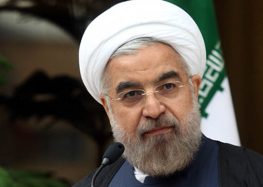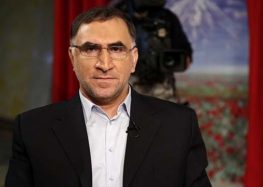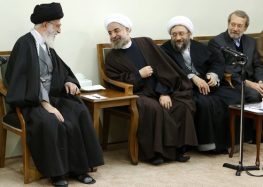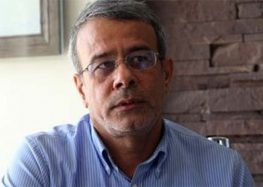Iran’s Supreme Leader Issues Familiar Anti-Protest Warning Ahead of 2017 Elections
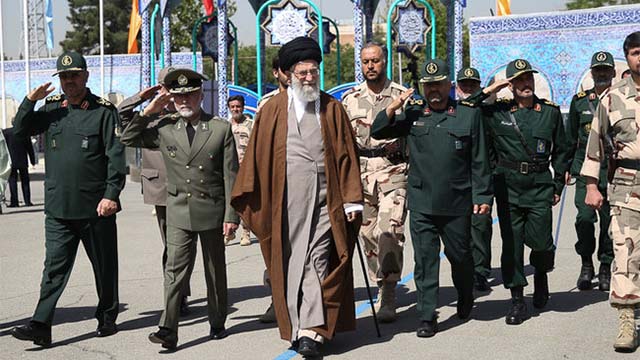
Any citizen or candidate who attempts to disrupt the upcoming elections will receive a “hard slap in the face,” warned Iranian Supreme Leader Ali Khamenei, in a recent speech reminiscent of one he gave in June 2009 amidst the widespread, peaceful protests against the vote count that year.
“If we prepare to confront attempts to create insecurity and sedition, we could undoubtedly neutralize them,” said Khamenei on May 10, 2017—nine days ahead of the presidential and local council elections—while addressing cadets of the Islamic Revolutionary Guard Corps (IRGC) at the Imam Hossein University in Tehran.
Iranian officials have consistently referred to the widespread, peaceful protests that followed the disputed 2009 presidential election as the “sedition.”
Khamenei made the statement while addressing future officers of the IRGC, the powerful, ultra-conservative military force functioning alongside Iran’s traditional military that violently suppressed the street protests in 2009.
As six presidential hopefuls and thousands of candidates for Iran’s local councils elections campaign around the country before the vote on May 19, the political and security establishment is seeking to prevent the outbreak of another popular uprising.
“The country’s security and tranquility are very important,” said the hardline supreme leader, “and the honorable candidates must be careful not to make the mistake of agitating ideological, geographical, linguistic and ethnic fault lines, and avoid falling into traps set by enemies to complete their idle plans, because if any one tries to do something against national security, he will certainly get a hard slap in the face.”
In the run-up to the elections, security and judicial authorities have been targeting reformist supporters of President Hassan Rouhani, who is seeking a second term.
More than 20 reformist journalists as well as political and civil rights activists have been arrested in recent months. Campaign speeches by prominent supporters have meanwhile been forcibly canceled in several cities.
2009 Redux
Khamenei’s speech was reminiscent of one he gave on June 19, 2009, in reaction to the massive, peaceful demonstrations in Tehran and other cities that week that ensued for months after incumbent President Mahmoud Ahmadinejad was declared winner of that year’s election.
“Like it or not, if politicians trample on the law and blind the eyes as they try to groom the eyebrows, they will be responsible for any bloodshed, violence and chaos,” said Khamenei during a Friday prayer sermon in Tehran that gave the green light to security forces to crush the protests.
At the time, Khamenei blamed the uprising on western powers seeking to instigate regime change in Iran, an accusation he repeated in his most May 2017 recent speech.
“Several years ago, a Zionist businessman told the media that he had spent 10 million dollars to stage a Velvet Revolution in (the Republic of) Georgia and install a new government,” said Khamenei in June 2009. “These idiots think they can do the same thing in the Islamic Republic of Iran. How can you compare Iran with other countries? The problem with our enemies is that they have yet to understand the Iranian nation.”
He continued: “That rich, sinister Zionist, who said he had turned Georgia upside down with 10 million dollars, had the stupid idea to make the same impact on a country as great as the Islamic Republic of Iran, but the plan hit a wall: The people’s will and national determination.”
Khamenei also called on the presidential candidates to focus on economic issues and “make it clear that they stand against the greedy demands of the US and Zionists.”
Crackdown
A number of reporters and political figures have been summoned over the phone by the IRGC’s Intelligence Organization ahead of the elections, the Center for Human Rights in Iran (CHRI) has learned.
“I received a phone call from someone named ‘Emad’ from the IRGC Intelligence who summoned me… to stop my speeches and interviews in favor of Rouhani. I told him I’m not coming in,” tweeted Mostafa Tajzadeh, a close aide of reformist leader and former President Mohammad Khatami, on May 9.
“Tomorrow they will probably send me a formal judicial summons. In the 2009 (presidential election) we were issued arrest warrants three days before the vote…” said Tajzadeh, who spent more than six years in prison for supporting the protests that year.
Renewed calls have been issued in recent days to resolve the extrajudicial house arrest, ordered by Khamenei, of 2009 presidential candidates Mehdi Karroubi and Mir Hossein Mousavi, and Zahra Rahnavard for disputing the election and calling for the peaceful protests that ensued.
“I promise to pass on your message and follow it up with all my power,” said Rouhani on April 29 at a campaign rally in Kerman in response to hundreds of supporters demanding the opposition leaders’ releases.
Rouhani also pledged to release political prisoners during his 2013 presidential campaign.
In an interview with the semi-official Iranian Students News Agency (ISNA) on May 8, conservative Deputy Parliament Speaker Ali Motahhari, who has consistently advocated for the release of the three opposition leaders, also said the issue could be resolved through negotiation.
“Some steps have been taken towards resolving the house arrests and we have to listen to the reasoning by the opposing side,” said Motahhari. “We have to move towards improving the conditions in the country and prevent issues before they turn into a crisis.”
“That in part depends on the future government,” he added. “We have to bring in a government that believes in not making matters worse.”

